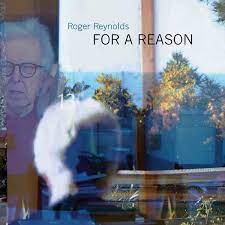
Click here to visit the Fanfare website.

REYNOLDS Dream Mirror (Sharespace I)1,3. Shifting/Drifting (Sharespace IV)2,3. Here and There4. Sketchbook5,3 - 1Pablo Gomez Cano (gtr); 2Irvine Arditti (vn); 3Paul Hembree (computer); 4Steven Schick (perc); 5Liz Pearse (voice/pn) - NEUMA 128 (2 CD; 1:44:30)
Roger Reynolds (b.1934) has been a presence in American new music for decades — he’s currently nearing the conclusion of the ninth of his life. While devoted to an ideal of modernist exploration and complexity, he has never fallen easily into any clearly defined “school”. Rather, he possesses a questing intellect that searches for an understanding of the issues, problems, and challenges that he identifies, and then grapples with them in the music. So even though very much a modernist championing complexity, he is also a “maverick”. One of his good friends, the late Iannis Xenakis, is something of a European analogue. I think of him as existing in a sweet spot between the American traditions of formalist/constructivist composition, and experimentalism.
This release on Neuma is a great gift to both the composer and us the listening audience. Though Reynolds’s career has had many high points, I still feel this is a milestone. It’s a celebration of many things: of new and ambitious works, of a worldview that is explained in depth in this program (more below), and of a series of creative collaborative friendships that have resulted in not just these pieces, but often multiple works.
Two of the pieces involve extensive interaction between instrumental, soloists, and live computer electronics (both are part of the Sharespace series.). Dream Mirror (2010) is for classical guitar, and Shifting/Drifting (2015) for violin. Both start from the solo source, and then an ever-evolving and -expanding texture envelops it, due to the electronic component. Paul Hembree is the technological partner to Pablo Gómez Cano and Irvine Arditti; while I am reading between the lines of the documentation, it appears that his part consists of dozens of pre-recorded “seeds” of each instrument, which are then triggered/mixed/processed in real time to create the fluidly evolving accompaniment. The result is the sort of interaction that one associates with great classical chamber performance.
The other two works feature voice, though executed by performers in a context that extends beyond their usual profile. They are “inversions” of one another. Stephen Schick, one of our greatest percussionists, in Here and There (2018), recites a Beckett text along with performing on a restricted group of instruments (focused in the different sections on bass drum and vibraphone). Liz Pierce, in Notebook (1985), is a superb singer in the contemporary idiom, but she also accompanies herself on piano (with quite some chosp!), while singing and reciting a text from Milan Kundera.
The entire package is enhanced by a sumptuous program book with a thoughtful and detailed essay by the critic Thomas May. And the album title, For a Reason, comes from a concurrent video documentary about the composer by the filmmaker Kyle Johnson. As far as I can tell, it is not yet available for public viewing, but in the short window that Neuma allowed as part of an extended “release party”, I was able to see it. It’s a remarkably creative and sensitive composer portrait, and I hope that anyone who gets this disc will eventually be able to watch it as well. Each of the works on the program are highlighted, and in particular I found the excerpts of Schick’s performance to be utterly compelling--they give a heightened sense of what the work really projects dramatically.
All the performances are authoritative, and one has to assume that, since the composer was closely involved in all the recordings, they are as definitive as possible. I very much like division of the program into two groups – one featuring instrument and computer in dialogue, the other, voice and instrument embodied in a single performer (though I should add there are small technological interventions in Notebook). Of the four works, only Notebook seems at a slightly lesser level of conception and realization. This is definitely not because of Pearses’s performance, which is clear, accurate, and impressive. It’s just that I think the relationship between the voice and instrument is not as fully conceived and explored as the case in the other works. (Reynolds’s concept and technique here evidently has had more than thirty years to grow.) To my ear, the gap between the two sound worlds of voice and piano is still a little too great. The notes suggest that even Reynolds feels so, though he was convinced by the current performance to allow the piece new life.
Overall, I feel this is the sort of release that would bring enormous satisfaction to any composer reaching the culmination of her or his career. It touches so many aspects of the work in so many different ways. Bravo to all the participants, and to Neuma on its commitment to depth and quality. I’m happy this came through in time for me to be able to included on this year’s Want List.
Robert Carl
5 stars: A magnificent tribute to a rich, varied, and still-evolving creative career.